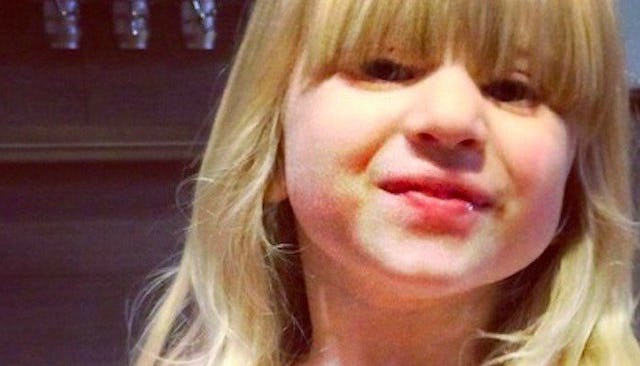My Child's Apraxia Challenged The Overachiever In Me

I lived the first 32 years of my life being an obsessive overachiever. I needed to get the best grades, have a perfect driving record, and get to the highest level on Candy Crush. As my daughter’s due date drew closer, I envisioned raising my own little certifiably genius overachieving child who would know all her colors before her 1st birthday and be reading chapter books by the age of 4 — okay, maybe 5. We’ll cut her a little slack.
As she grew that first year, I ambitiously ticked off each milestone and rejoiced in her brilliance when she reached one much earlier than the so-called experts claimed was typical. She had her full set of baby teeth at 17 months. Of course, she was destined for greatness. Rolling over, sitting up, eating solid foods, walking — I was already pricing flights to Stockholm so we could accept her Nobel Prize!
A few weeks before her first birthday, we spent the day with a friend’s little boy who was just a few months older than our daughter and was already stumbling his way through most of the alphabet. My competitive spirit kicked into overdrive. If he can do it, my daughter can do it! Then 15 months rolled around and still no alphabet. In fact, she had no distinguishable words at all.
At 18 months, all her friends were showing off their impressive vocabulary of animals, household items, names of family members, and TV characters. My daughter had attempted a few times to say “Momma,” although it came out more like “Mamamamamama.”
Why didn’t she have any words? She should be reading by now. All the medical professionals in her life kept saying, “She’s just a late bloomer. Lots of kids don’t talk until they’re 2,” and “Just give her time.” But I didn’t want to give her time — I wanted shock and awe at her 2nd birthday party when she recited the Pledge of Allegiance in front of all our friends.
After she turned 2, we started digging in to get to the root of the issue. We heard words like “autism” and “deafness.” We saw lots of specialists: ear doctors, head doctors, and therapists. Finally, everyone came around to the only diagnosis that made sense: apraxia. I had to face the truth that my daughter wouldn’t be the youngest person in her Sunday school class to recite the alphabet backward. In fact, she wouldn’t speak any intelligible words until after her 3rd birthday. It took her a full six months of speech therapy to even start to get the hang of the letter “B.”
Apraxia challenged the overachiever in me. It felt like all my hopes and dreams for this little person came to a screeching halt. How can I teach her 200 sight words before kindergarten if I can’t understand her? How will I know if she can count to 100 when she only speaks with vowels? How will she give her valedictorian speech if she can’t even talk?
We are now eight months post-diagnosis, and this spunky little girl has taught me to embrace the fact that she is on her own timeline. Whatever accolades I may have wanted for her, no matter how wonderful they may be, might never be a reality. We don’t get a detailed milestone calendar with apraxia. It’s all a big unknown. I don’t like that. I’m task-oriented. I want a measurable goal we can work toward. I want to check things off our list. I want someone to tell me when my daughter might be able to “catch up” with other kids her age, although I know she might not ever catch up.
Progress is important, but I know her greatest achievement won’t be the day she finally begins a word with a consonant sound. In my mind, she’s already an overachiever. She faces life every day with a disability that makes one of the most basic, natural human functions extremely difficult for her. She could easily be embarrassed about her disability, but she isn’t. She’s aware of it, but she doesn’t hide. She’s a social butterfly, she loves to sing, she loves books, and she makes friends wherever she goes.
My daughter’s diagnosis taught me to slow down and enjoy her life as it unfolds. I’ve learned to let go of who I think she needs to be and embrace who she is. I don’t want to waste time wishing for a childhood that I projected on her. I want to walk in step with her, at her pace and on her own time.
It can be a long road with apraxia. But who knows? There might still be a valedictorian speech waiting for her at the end of it.
This article was originally published on